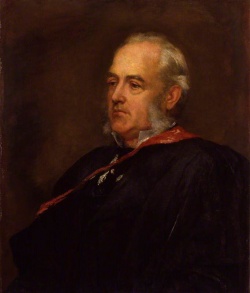Max Müller
Friedrich Maximilian Müller (December 6, 1823 – October 28, 1900), generally known as Max Müller, was a German-born philologist and Orientalist, who lived and studied in Britain for most of his life. He was one of the founders of the western academic field of Indian studies and the discipline of comparative religion.
Personal life
Academic career
Müller was defeated in the 1860 election for the Boden Chair of Sanskrit by Prof. Monier Williams. Müller was far better qualified for the post, but lacked practical first-hand knowledge of India. Also, both candidates had to emphasize their support for Christian evangelism in India, since that was the basis on which the Professorship had been funded by its founder. Müller's broad theological views cast doubts about his dedication to Christianization.
Müller wrote both scholarly and popular works on the subject of Indology. The Sacred Books of the East, a 50-volume set of English translations, was prepared under his direction. He also promoted the idea of a Turanian family of languages and Turanian people.
Praise of Müller's work
Swami Tathagatananda, of the Ramakrisha Mission and the Vedanta Society of New York, wrote in his Journey of the Upanishads to the West:
Müller's lifelong dedication to the study of the Vedas and his scholarly eminence left a legacy of two major works in addition to his other volumes: The Rig-Veda with Sayana's Commentary in six volumes and the famous series, The Sacred Books of the East, in fifty-one volumes, which he edited. The vast corpus of India's scriptural literature that he made available to the world is a profound tribute to Indian thought by this western scholar.[1]
Criticisms of Müller's work
According to Mahatma Koot Hoomi, Müller "was not sufficiently conversant with Indian thought to interpret properly some of the books he translated."[2]
Many modern Hindus take a harsher interpretation. This example is from the Encyclopedia of Authentic Hinduism: "Max Müller was a British agent, especially employed (in 1847) to write the translations of the Vedas in such a demeaning way so that the Hindus should lose faith in them."[3] India Today recently published an article called "Max Muller: The Man Employed to Create a Distorted Translation of the Vedas."[4]
Writings
These are some of Müller's major writings:
Chips from a German Workshop. London: Longmans, Green & Co., 1867-75. 4 volumes.
- Volume I is available at Gutenberg.org and Hathitrust.
- Volume II is available at Hathitrust.
- Volume III is available at Hathitrust.org.
- Volume 4 is available at Gutenberg.org and Hathitrust.org.
The Sacred Books of the East. 50 volumes.
- Oxford, Clarendon Press, 1879-1910. First edition. Most volumes available at Hathitrust.
- Oxford : Clarendon, 1895. 2nd edition. Some volumes available at Hathitrust.
- New York, Christian Literature Co., 1897-1898. First American edition. Some volumes available at Hathitrust.
- Delhi: Motilal Banarsidass, 1962-1966.50 volumes. Volumes available at Hathitrust.
The Hymns of Rig-veda in the Samhita and Pada Texts..
- First edition - London : Trübner & Co., 1873. Available at Hathitrust.
- Second edition - London, Trübner, 1877. Available at Hathitrust.
- Many other editions and printings are available at Hathitrust.
Published lectures
- Lectures on Buddhist Nihilism.
- Natural religion; the Gifford lectures delivered before the University of Glasgow in 1888. London, New York: Longmans, Green, and Co., 1889. 608 pages. Available at Hathitrust and Internet Archive.
- Three Lectures on the Vedanta Philosophy.
- What Can India Teach Us?
Other works
- Comparative Mythology. New York: Arno Press, 1909.
- Contributions to the Science of Mythology. London, New York and Bombay: Longmans, Green, and Co., 1897. Available at Hathitrust and Internet Archive.
- Immanuel Kant's Critique of Pure Reason. Translated by Müller. New York, Macmillan Co.; London, Macmillan & Co.: 1896. "First edition printed 1881; reprinted with alterations, 1896."
- My Autobiography: a Fragment. New York: C. Scribner's Sons, 1901. Available at Hathitrust, Internet Archive, Google Books, and other online sources.
- Old Lang Syne. New York: C. Scribner's Sons, 1898. Contents: "Musical recollections.--Literary recollections.--Recollections of royalties.--Beggars."
- History of Ancient Sanskrit Literature
- A Sanskrit Grammar
- A Physical Religion
- Ramakrishna, His Life and Sayings
- Rg-Veda with Sayana's Commentary
- The philosophy of Vedanta** The Six Systems of Indian Philosophy
Collections
- The essential Max Müller: on language, mythology, and religion. Collected by Jon R. Stone. New York: Palgrave MacMillan, 2002.
Additional resources
- "Max Müller" in Wikipedia.
- "Friedrich Max Müller" in the Gifford Lectures website.
- "Hindu Prayers for Professor Max Muller" in The Open Court Vol. 1900: Iss. 4, Article 5 at OpenSIUC.
Notes
- ↑ Swami Tathagatananda, Journey of the Upanishads to the West (Kolkata: Advaita Ashrama, 2002), 63.
- ↑ George E. Linton and Virginia Hanson, eds., Readers Guide to The Mahatma Letters to A. P. Sinnett (Adyar, Chennai, India: Theosophical Publishing House, 1972), 240.
- ↑ "Max Müller" in Encyclopedia of Authentic Hinduism website.
- ↑ Max Müller in India Today June 12, 2016.
